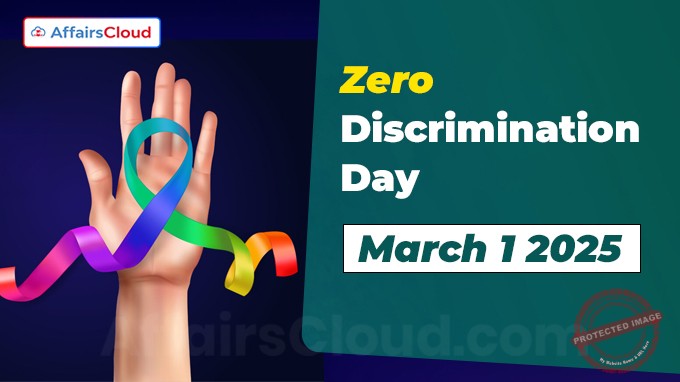
The United Nations (UN’s) ‘Zero Discrimination Day’ is observed annually on March 1st across the globe to promote equality, inclusion, peace, and diversity. The day serves to raise awareness about the damaging effects of discrimination and emphasizes the right of every individual to live a fulfilling and dignified life.
- March 01, 2025, marks the observance of the 11th Zero Discrimination Day.
- The theme for Zero Discrimination Day 2025 is “We Stand Together,” highlighting a particular aspect of discrimination.
Background:
i.In 2013, on the occasion of World Acquired Immunodeficiency Syndrome (AIDS) Day(December 1) , UNAIDS launched the Zero Discrimination Campaign, aiming for a global transformation toward equality and inclusion.
ii.This campaign was introduced under the leadership of Daw Aung San Suu Kyi, Nobel Peace Prize laureate and ‘UNAIDS Global Advocate for Zero Discrimination’, with the hashtag #zerodiscrimination.
- The first-ever Zero Discrimination Day was observed on March 1, 2014.
iii. The inaugural event was led by Michel Sidibé, then-Executive Director (ED) of UNAIDS, in Beijing, China, setting the stage for an annual observance focused on promoting dignity and equality for all.
iv.The primary aim is to eliminate discrimination based on factors such as income, sex, age, health status, occupation, disability, sexual orientation, drug use, gender identity, race, class, ethnicity, and religion.
Note: UNAIDS, a Joint UN Programme on Human Immunodeficiency Virus (HIV) and AIDS, organizes this day each year, bringing together communities worldwide to demand equality for everyone.
Symbol:
The ‘butterfly’ serves as the symbol for Zero Discrimination Day, representing transformation and change.
- This emblem underscores the campaign’s goal of fostering a world where everyone can live a life of dignity, free from discrimination.
Global AIDS Strategy 2021-2026:
i.Adoption: On March 25, 2021, the UNAIDS Programme Coordinating Board (PCB) unanimously adopted the new Global AIDS Strategy 2021-2026, titled “End Inequalities, End AIDS.”
- The PCB adopted the strategy during a special session chaired by the Minister of Health of Namibia, held on March 24-25, 2021.
ii.Comprehensive Approach: This strategy outlines a roadmap for tackling the underlying factors that fuel HIV/AIDS and aims to ensure universal access to healthcare and rights for all individuals, with an urgent call to end AIDS as a public health threat by 2030.
iii.Bold Targets: It sets ambitious targets and policies to be achieved by 2025, energizing global commitment to end AIDS.
UNAIDS 2025 Targets:
i.The UNAIDS Global AIDS Strategy 2021–2026 sets ambitious targets to significantly reduce new HIV infections and AIDS-related deaths by 2025.
- The goal is to significantly reduce new HIV infections, with a target to decrease the number of new cases from 1.7 million in 2019 to fewer than 370,000 by 2025.
ii.This represents a reduction of approximately 78% in new HIV infections over the 6 years. The aim is to reduce AIDS-related deaths from 690,000 in 2019 to fewer than 250,000 by 2025.
iii.This goal aims for a decrease of about 64% in AIDS-related deaths by 2025 by eliminating new HIV infections among children, reducing the number from 150,000 in 2019 to fewer than 22,000 by 2025.
iv.This target seeks to reduce new HIV infections in children by approximately 85% within the specified time frame.
v.From 2010 to 2021, New HIV infections decreased by nearly 22%, and HIV-related deaths fell by almost 40%.
Challenges:
i.Gender Equality: Gender-based discrimination remains widespread: Women have less than two-thirds of the legal rights of men, and the global gender pay gap is 20%.
- One in three women has experienced physical or sexual violence.
- Women hold only 10% of Head of State positions globally.
ii.Discrimination in Employment: Workplace discrimination remains a significant issue, with 88,531 cases of discrimination recorded in the United States (US) Equal Employment Opportunity Commission (EEOC) Report for 2024, a 9% increase from 2023.
About UNAIDS:
The Joint United Nations Programme on HIV/AIDS was founded by the UN Economic and Social Council (ECOSOC) and continues to be the only joint program co-sponsored by the UN system.
Executive Director (ED)– Winnie Byanyima
Headquarters– Geneva, Switzerland
Founded– 1996




